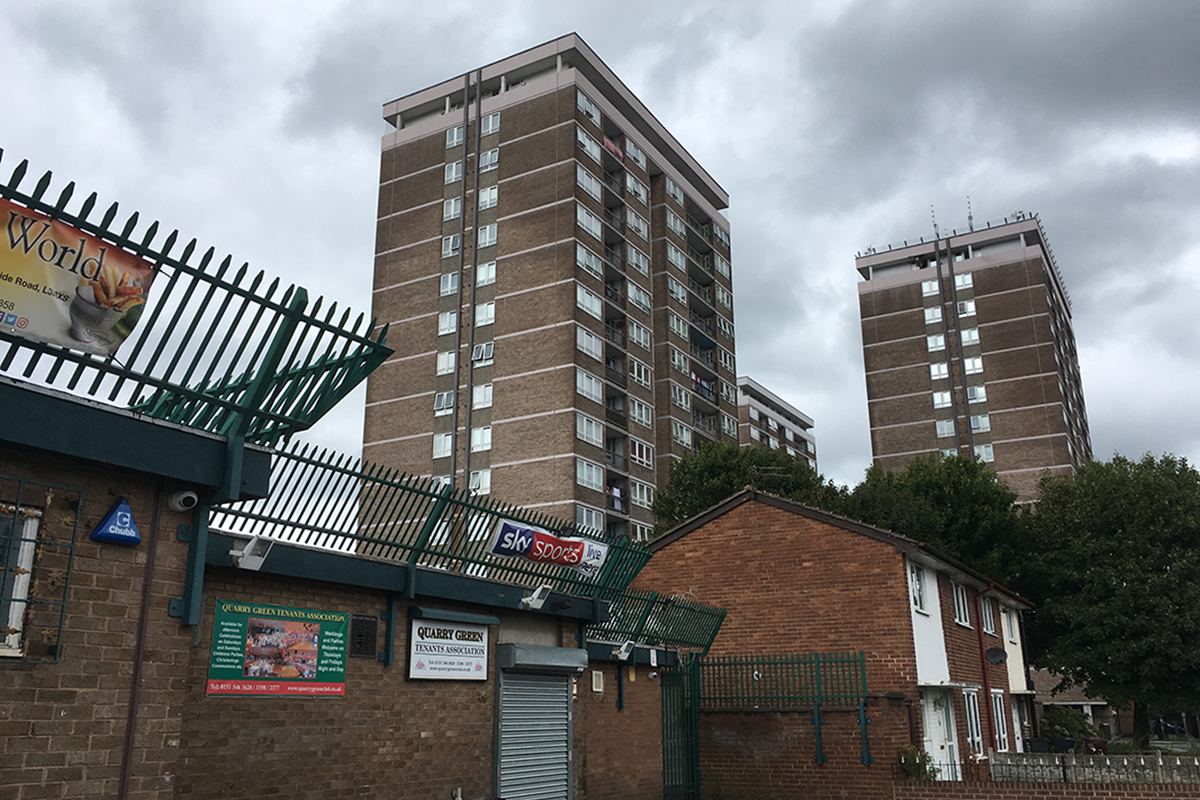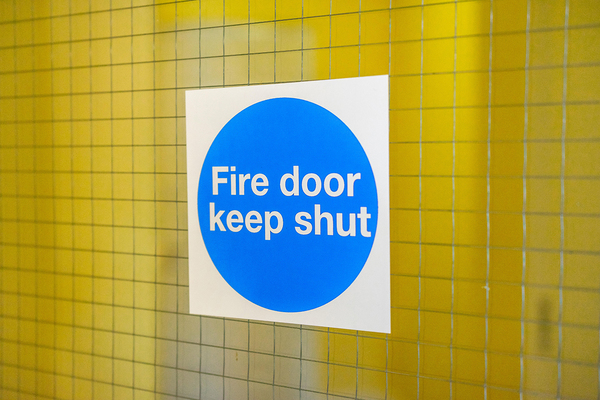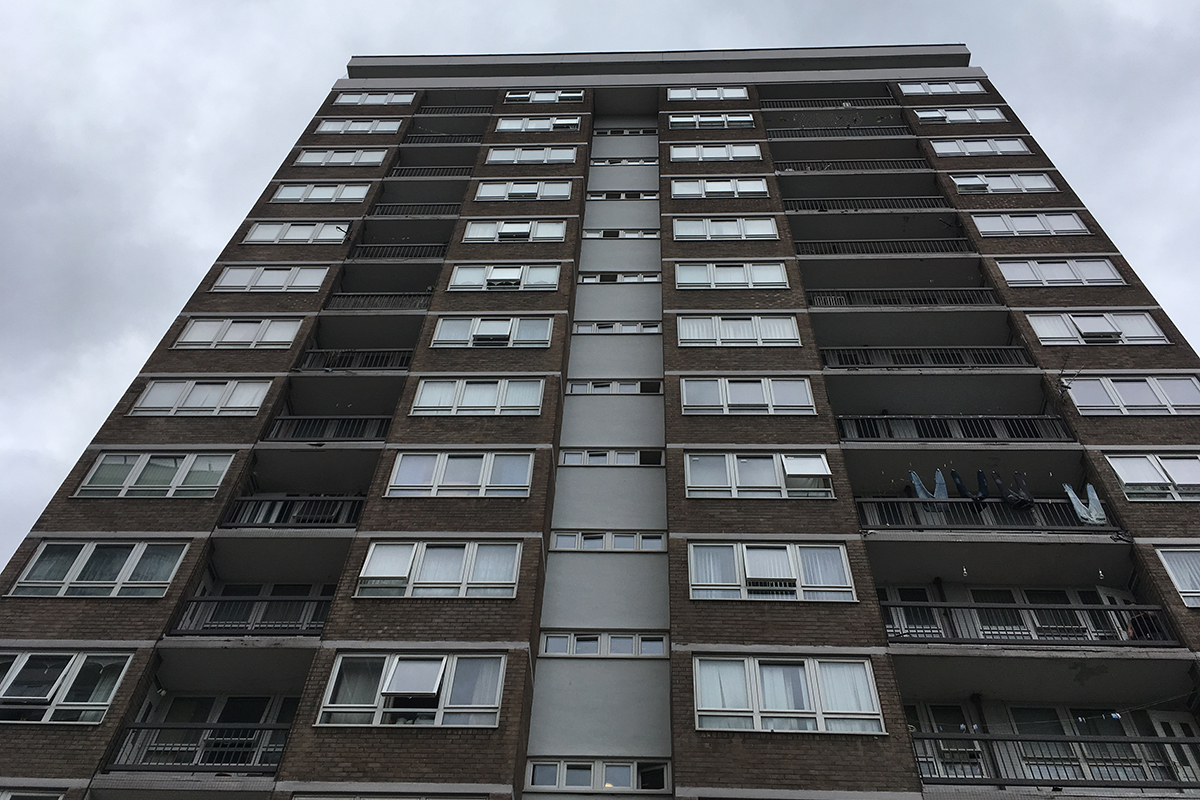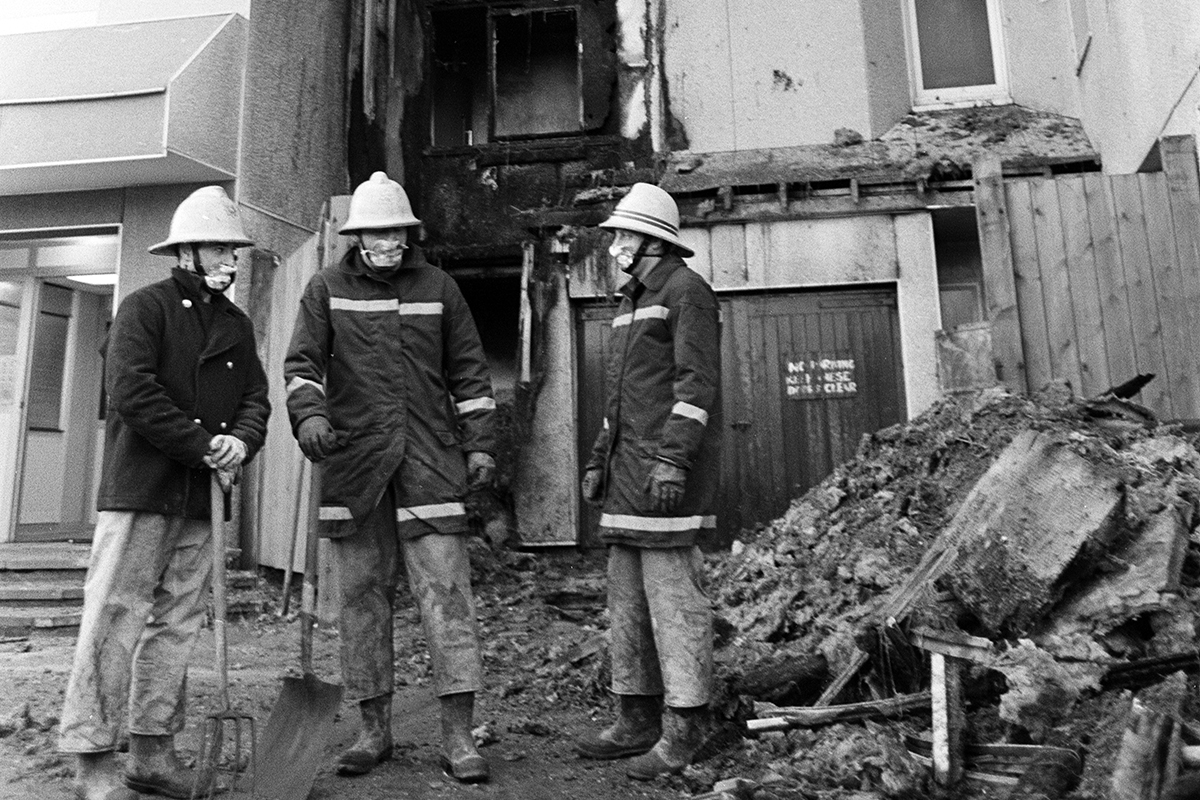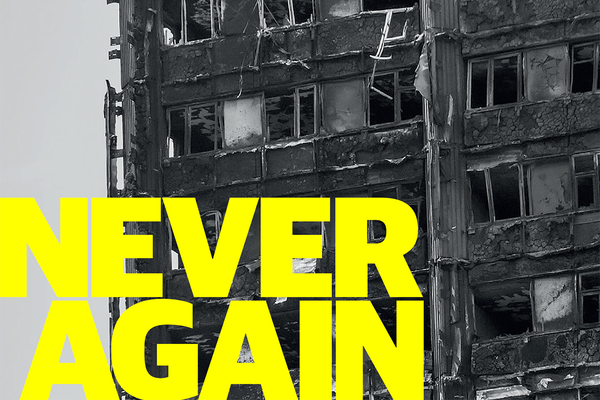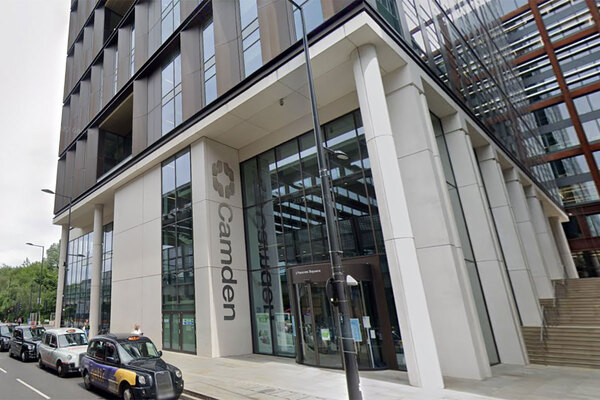Knowsley Housing Trust: what went wrong?
Knowsley Housing Trust was deemed ‘non-compliant’ by the regulator in the wake of fire safety failings at the Quarry Green Heights Estate. For the first time, Nathaniel Barker tells the full story of what went wrong. Pictures by Nathaniel Barker and Mirrorpix
Quarry Green Heights Estate in Kirkby, Merseyside, which was the subject of three fire enforcement notices
On 5 April 1991, someone set light to a pile of rubbish outside a tower block on the Knowsley Heights Estate in Huyton, Merseyside.
Flames clambered hungrily up the side of the 11-storey building, which had recently been fitted with new rainscreen cladding.
Miraculously no one was hurt, but the blaze was the stark first warning in this country about the potential danger posed by external insulation systems.
It was a warning which ultimately went unheeded, as became all too apparent on 14 June 2017.
It is grimly poetic then, that the first social landlord to be censured by the regulator for major fire safety failings since the Grenfell Tower disaster now owns the Knowsley Heights Estate, which was still council-owned in 1991.
In August, Knowsley Housing Trust (KHT) was handed a non-compliant G3 grading for governance by the Regulator of Social Housing (RSH) following an in-depth assessment. Its verdict on the 13,000-home landlord pointed to “weaknesses in governance, and in the effectiveness of board oversight and scrutiny including incidents of inadequate reporting”. The fire safety issues which sparked the downgrade “potentially affected hundreds of tenants for a number of months”.
So what went wrong, and what now for KHT?
Events began unfolding in November 2017, when Merseyside Fire and Rescue Service (MFRS) issued KHT with enforcement notices for its three high rises on the Quarry Green Heights Estate in Kirkby, warning that residents were not safe should a fire break out.
The problems related to the blocks’ fire doors, bin stores, evacuation routes and “general fire precautions”.
They had first been identified by fire risk assessments (FRAs) conducted in the wake of Grenfell, but the association failed to show it was acting on the recommendations and subsequently ignored warning letters from the fire service.
"One source says that emails from MFRS were being deleted by an individual who has now left the organisation"
Tony Cahill, executive director of KHT, and Helen White, chair of the association’s board and head of the Regulatory Board for Wales, both say the enforcement notices came as a shock. “We had met with MFRS a number of times on that site and other sites as we do over a period of time,” Mr Cahill tells Inside Housing. “And I personally didn’t have any foresight of their concerns that they weren’t getting assurance that work was being progressed.”
He believes the “dominant reason” the enforcement notices were issued is that KHT “didn’t communicate effectively” with the fire service about its programme of work at Quarry Green – which would be carried out by Vivark, a maintenance company in the same group.
It wasn’t clear between Vivark and KHT who should be communicating with MFRS about progress to resolve issues highlighted by the FRAs, Mr Cahill says.
Yet it appears there is more to this story. For instance, one source says that emails from MFRS were being deleted by an individual who has now left the organisation.
A spokesperson for KHT admits that fire service emails were “not escalated within KHT and as a result MFRS did not receive the assurance that these matters were being dealt with appropriately”.
That perhaps points to problems which run deeper than a simple case of crossed wires. The regulator’s ‘grading under review’ notice refers to an internal audit carried out in the wake of the enforcement notices “which indicated a systemic failure in relation to statutory compliance”.
The report identified compliance issues with water safety and asbestos safety, as well as fire safety. Nevertheless, up until very recently, a banner on KHT’s website boasted that “the safety of our tenants is our top priority”.
Perhaps most significantly, MFRS hit KHT with four more tower block enforcement notices at its Gaywood Green Estate shortly before the regulator published its G3 judgement, this time for compartmentation issues.
Mr Cahill says the fire service did so to make sure FRA actions were completed “in a timely manner”.
It’s also worth noting that Vivark was in the clutches of an industrial dispute towards the end of 2017, with 120 repairs workers downing tools on a series of strike days.
George Howarth, Knowsley’s veteran Labour MP, did not share Mr Cahill and Ms White’s surprise at the three enforcement notices. “I had become increasingly concerned about the performance of KHT for a variety of other reasons,” he says. “Most importantly I got an increasing sense that they had become detached from the main job they had, which was to serve their tenants.”
Quarry Green Heights Estate in Kirkby, Merseyside, which was the subject of three fire enforcement notices issued in November 2017
Mr Howarth recalls multiple cases where he approached KHT on behalf of constituents facing housing troubles, only to meet with a “bureaucratic response”.
He adds: “I would meet with them maybe more than once or twice a year. You could not help but notice there was a rapid and continual turnover of senior management. There would be someone who had been brought in from the private sector, people who had run call centres and things like that – people who were looking at it as a business rather than a service.”
Ms White openly admits that “a culture of not focusing on the core business” was a “contributory factor” to KHT’s woes.
Its parent organisation First Ark Group is not registered as a housing provider.
The group counts among its subsidiaries the aforementioned Vivark, as well as private developer Oriel Living, First Ark Social Investment and investment charity One Ark, all incorporated in the past five years or so.
The RSH’s judgement referred to KHT’s lack of oversight over “activities taken in other parts of the group”, and Ms White says the board was already aware that this set-up is “over-cumbersome”, and that plans for a governance structure review were in place.
“The blood, sweat and tears that have gone into trying to drag us forward and sort the issue out has been pretty epic.” - Helen White, chair of KHT’s board and head of the Regulatory Board for Wales
“The original reason for setting up in that way was so we could leverage some [income from non-housing activities] and do more, and also, ironically, to de-risk the housing business part so that we were taking away the implications of anything going wrong in one part of the business from the housing bit,” she explains.
But she adds that “ambiguity around what sat where led to some of that lack of real understanding of where accountability and ownership of certain issues lay”.
Inside Housing has been told of a “toxic” atmosphere at the association by more than one former employee – including accusations of bullying and sudden sackings.
KHT maintains it has “always endeavoured to maintain a high-performing culture across the organisation, with employees being treated in line with our values at all times”.
Here may be where some of the major problems lie. It is telling that anonymous whistleblowers had raised concerns about fire safety before the Quarry Green fire enforcement notices were issued. Ms White says these were investigated in line with KHT’s whistleblowing policy, but none resulted in any issues being identified.
“During our engagement, KHT has demonstrated its commitment to putting things right, as has the unregistered parent First Ark, and it has been open and transparent with the regulator,” the RSH noted in its G3 judgement.
About Knowsley Housing Trust
- Formed in July 2002 after a transfer of 17,000 homes from Knowsley Council
- Now owns around 13,000 homes in four local authority areas, mainly for general needs social housing
- Part of a group with an unregistered parent called First Ark. Other subsidiaries in the group are Vivark, which handles repairs for KHT; private developer Oriel Living; One Ark, a local charity; and First Ark Social Investment, which manages the group’s social investment
- Reported a turnover of £64m for 2016/17 and employs 108 full-time staff
- Had a previous regulatory grading of G1 V1 – the highest possible grading for governance and financial viability – but was handed a G3 V1 on 1 August
“The blood, sweat and tears that have gone into trying to drag us forward and sort the issue out has been pretty epic,” says Ms White.
Extensive changes have indeed taken place at the association in recent months.
Ms White says huge resources were poured into discharging the Quarry Green notices ahead of schedule. Mr Cahill adds that Type 1 FRAs have been exchanged for more thorough Type 3s, with the association introducing a new “instant management protocol” to deal with actions – including a process for communicating with MFRS. He claims this has yielded very positive results at Gaywood Green.
From the board’s perspective, Ms White declares: “We absolutely accept responsibility.” She insists the board was asking about compliance at meetings, but reflects that its demands of executives were not robust enough. “It’s not like we didn’t have any information on it,” she says. “It’s just some of the reports we’ve had, now when you read them back you think, ‘Well, is that assurance or is that just reassurance?’ So [executives] were telling us things were fine, but [they] weren’t showing us things were fine.”
In response, KHT has established both a ‘compliance rectification group’ and a ‘governance working group’. Three “very much housing-focused” new board members have been appointed to replace three councillors and three tenants removed last year. According to Companies House, as of 21 May KHT has been converted to become a community benefit society.
The former health and safety advisor for Manchester Airport has also been hired, while a flurry of directors have moved on.
That includes Bob Taylor, First Ark and KHT’s chief executive, who in March announced his intention to retire at the end of 2018 after 14 years in the post. He left the organisation in late May, to be replaced by Ian Munro on an interim basis.
First Ark has now announced that Leann Hearne, executive director of shared services and business transformation at Riverside, will take over permanently in November. For the record, Ms White insists that KHT is “not at all” interested in a merger.
Aftermath of a fire on 5 April 1991 at Knowsley Heights Estate
And she says there’s now “a real focus on openness” at the organisation. “If anyone’s working in any area of the business and they’re thinking, ‘This doesn’t seem quite right’, or ‘I’ve been worried about this for a while’, we reinforce the message that we hope they can bring that up safely, that it’s not about a blame culture.”
Vital, but tricky to effect. And though the organisation appears to be moving in the right direction, there seems to be some way to go before KHT recovers its reputation with tenants.
Inside Housing met some of the locals at Quarry Green. A man in his 30s, who has lived in one of the towers for seven years, says: “Nine out of 10 times you will hear the same thing. It’s not a bad place to live, but the management is frustrating.” That opinion is borne out by all of the
people we speak to.
They have serious misgivings about the way KHT conducts its work at the towers. We hear that the blocks were recently completely rewired, inevitably causing significant disruption and leaving flats’ interiors in a sorry state. The association claims this work was because the blocks’ utility provider “advised... that the electrical supply to all properties required upgrading and needed to install a new supply to each flat at a different entry location than existing”. KHT offered tenants £170 to pay for redecorating – but residents say the money is not nearly enough to cover all the work required, and that they’ve been told they can only spend the money on one range of products from one shop.
Another gentleman, who doesn’t live on the estate but who was picking up his 89-year-old auntie, claims she lives on the 11th floor in a tower where the lift has been broken for several weeks – and so needs his assistance to leave her flat. What’s more, since the association closed off the refuse chutes in response to the enforcement notices, she is unable to even take out her own bins.
A spokesperson for KHT says: “During this time we have had, and continue to have, employees patrolling the blocks and supporting tenants in the removal of waste where this is required. There was a short period of time when one of the two lifts at the block was out of order, but both are now in full operation.”
Stories like this are signs, perhaps, that there is some way to go before the association returns to what MP Mr Howarth says was “in the early years… very much a new organisation that was doing the job”.
KHT is on the road to recovery, but the way looks long and rocky, with more blood, sweat and tears still to come.
Never Again campaign
In the days following the Grenfell Tower fire on 14 June 2017, Inside Housing launched the Never Again campaign to call for immediate action to implement the learning from the Lakanal House fire, and a commitment to act – without delay – on learning from the Grenfell Tower tragedy as it becomes available.
One year on, we have extended the campaign asks in the light of information that has emerged since.
Here are our updated asks:
GOVERNMENT
- Act on the recommendations from Dame Judith Hackitt’s review of building regulations to tower blocks of 18m and higher. Commit to producing a timetable for implementation by autumn 2018, setting out how recommendations that don’t require legislative change can be taken forward without delay
- Follow through on commitments to fully ban combustible materials on high-rise buildings
- Unequivocally ban desktop studies
- Review recommendations and advice given to ministers after the Lakanal House fire and implement necessary changes
- Publish details of all tower blocks with dangerous cladding, insulation and/or external panels and commit to a timeline for remedial works. Provide necessary guidance to landlords to ensure that removal work can begin on all affected private and social residential blocks by the end of 2018. Complete quarterly follow-up checks to ensure that remedial work is completed to the required standard. Checks should not cease until all work is completed.
- Stand by the prime minister’s commitment to fully fund the removal of dangerous cladding
- Fund the retrofitting of sprinkler systems in all tower blocks across the UK (except where there are specific structural reasons not to do so)
- Explore options for requiring remedial works on affected private sector residential tower blocks
LOCAL GOVERNMENT
- Take immediate action to identify privately owned residential tower blocks so that cladding and external panels can be checked
LANDLORDS
- Publish details of the combinations of insulations and cladding materials for all high rise blocks
- Commit to ensuring that removal work begins on all blocks with dangerous materials by the end of 2018 upon receipt of guidance from government
- Publish current fire risk assessments for all high rise blocks (the Information Commissioner has required councils to publish and recommended that housing associations should do the same). Work with peers to share learning from assessments and improve and clarify the risk assessment model.
- Commit to renewing assessments annually and after major repair or cladding work is carried out. Ensure assessments consider the external features of blocks. Always use an appropriate, qualified expert to conduct assessments.
- Review and update evacuation policies and ‘stay put’ advice in the light of risk assessments, and communicate clearly to residents
- Adopt Dame Judith Hackitt’s recommended approach for listening to and addressing tenants’ concerns, with immediate effect
CURRENT SIGNATORIES:
- Chartered Institute of Housing
- G15
- National Federation of ALMOs
- National Housing Federation
- Placeshapers
Inside Housing Spotlight
Inside Housing Spotlight is a series of pieces showcasing the best of our investigative and data journalism.
Spotlight pieces:
14 December 2018: Starting to bite - how Universal Credit is making people homeless: we reveal new figures showing a clear link between Universal Credit and homelessness
9 November 2018: First Priority - the inside story of a housing association which almost went bust When a small supported housing provider entered into a series of leasing deals with investment funds, it nearly spelled disaster for its vulnerable tenants. We investigate why.
12 October 2018: The ballad of Knowsley Housing Trust the inside story of the first housing association made non-compliant by the sector's watchdog for fire safety issues
13 September 2018: How tweaked building guidance led to combustible insulation on high rises: an investigation shows how lobbyists from the plastic insulation industry supported a quiet tweak to building guidance to permit combustible insulation on tall buildings
31 August 2018: The true cost of homelessness Freedom of Information requests reveal the soaring costs of temporary accommodation
30 August 2018: The forgotten threat to high rise tenants We investigate the threat posed by combustible window panels on social housing high rises
13 June 2018: The Biggest Ever Survey of Fire Risk Assessments Data journalism revealing widespread fire safety issues in more than 1,500 tower blocks across the country
12 April 2018: A Section 106 Story An investigation into allegations of "sham transactions" involving Section 106 deals in south London
23 March 2018: The Paper Trail: The Failure of Building Regulations A lengthy investigation into the failures of building regulation that may have contributed to the Grenfell Tower disaster, and the many missed warnings
23 February 2018: The Kingspan Papers Leaked meeting notes reveal some worrying issues, including allegations of fire safety report doctoring by manufacturers
9 February 2018: Gentoo: a Sunderland story We look back at the recent history of Sunderland’s largest housing association.
25 January 2018: Homeless families face long stays in council-owned hostels we reveal how councils in London are skirting the law by using hostels to house people in temporary accommodation for more than six weeks
7 December 2017: Council house to private rent We reveal the percentage of former Right to Buy homes in the private rented sector has passed 40%
17 November 2017: Rent to buy, or rent to rent? A look at how successful the government's Rent to Buy schemes have been
7 September 2017: Once upon a time in the west The history of KCTMO in the years before the Grenfell Tower fire
11 August: 2017 Grenfell: The paper trail - our news editor Pete Apps examines seven years of council documents to tell a story of the missed opportunites to prevent the Grenfell tragedy
4 August 2017 : Knowing the risks – the most common fire safety problems in tower blocks
26 May 2017: Rents hiked for RTB replacements – Sophie Barnes reveals less than half of Right to Buy replacement homes are for social rent
12 May 2017: A stark warning – a prescient piece looking at lessons to be learned from the Shepherds Bush tower block fire
13 April 2017: Where the axe will fall – a look at plans to axe housing benefit for younger people
10 Feb 2017: Circle of Despair – the inside story of Circle's repairs and maintenance troubles
3 Feb 2017: The Benefit Cap Tightrope – Sophie Barnes unveils the first exclusive analysis of the lower benefit cap
